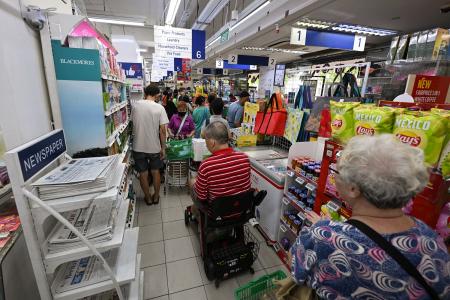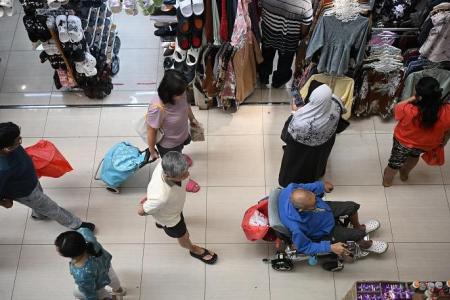Malls, supermarkets welcome personal mobility aid users but others voice safety concerns
An incident on Nov 12 at AMK Hub, in which an elderly couple were asked to relocate their personal mobility aids (PMAs) because they were parked “indiscriminately” and “to avoid obstructions” has reignited the debate over the use of such vehicles in indoor spaces.
Four major mall operators – CapitaLand, Lendlease, Frasers Property and Link Reit – told The Straits Times that PMA users are allowed within their premises, in line with their aim to provide a safe and inclusive shopping experience.
PMAs include vehicles such as mobility scooters and motorised wheelchairs and are designed to carry individuals who have difficulty walking.
While the Land Transport Authority regulates the use of active mobility devices on footpaths outdoors, indoor spaces are not under its purview and are subject to rules, if any, set by property owners.
Lendlease’s head of asset operations Jenny Khoo said its malls have “ample provisions” to support PMA users, such as proper ramp access and wider pathways. The company, which operates malls such as Jem and Paya Lebar Quarter, is also working with non-profit organisation Disabled People’s Association to develop additional measures to improve accessibility while reviewing existing ones.
A spokesperson for Frasers Property, which manages malls such as Tiong Bahru Plaza and Northpoint City, said: “We constantly seek ways to improve accessibility at our malls and provide barrier-free access for persons with mobility challenges and disabilities.”
The spokesperson added that security personnel on patrol will also help ensure that the PMAs are used safely and parked responsibly within its malls “to ensure a pleasant experience for all”.
Besides shopping malls, local supermarket chains such as FairPrice that see high foot traffic also allow PMAs to enter their stores.
A spokesperson for FairPrice Group said “front-liners stand ready to offer assistance to seniors and persons with disabilities” at all outlets. “There are also strategically placed signs in-store, ensuring not only accessibility but also the safe usage of PMAs.”
However, even as malls are moving to welcome PMAs and their riders, other mall users have flagged concerns over the safety risks posed by mobility aids and called for their restriction in indoor spaces.
Mr Joseph Chua, who frequents Bedok Mall and other shopping malls, felt that mobility aids are fire hazards and should not be allowed in indoor spaces.
“Many users also ride very closely to other visitors, obstruct the walkways and cause inconvenience for others who have to avoid getting hit,” added the technology consultant, 46.

Mr Vincent Low, himself a user of a mobility scooter because of a spinal condition that limits his leg function, acknowledged the risk of PMA users colliding with other visitors in confined spaces.
The retired teacher, 58, said PMA users should avoid visiting shopping malls on weekends and public holidays, when human traffic is at its peak.
“There’s always a risk of people who ride fast getting into accidents. It is on the rider to be aware of the environment around them and be extra-careful when riding, especially on weekends,” said Mr Low.
But allowing PMAs to enter malls is non-negotiable, he said, as these spaces are essential in allowing those with disabilities to integrate into the community and socialise with family and friends.
Ms Joyce Wong, director of the centralised services division at SPD, a charity formerly known as the Society for the Physically Disabled, lauded the efforts of mall operators who have put in place services to improve accessibility, such as the provision of wheelchairs.
As Singapore moves towards becoming a “super-aged society”, it is likely that there will be more users of mobility aids in the future, she added. Thus, keeping accessibility requirements such as wider walkways in mind during the design and renovation of malls would help to ensure a pleasant shopping experience for all visitors.
However, she urged PMA users to behave responsibly in shared spaces, saying: “PMA users should also play their part by using their aids in a safe manner, such as keeping to walking speeds of 4kmh to 5kmh in indoor spaces to avoid any accidents.”
Get The New Paper on your phone with the free TNP app. Download from the Apple App Store or Google Play Store now


